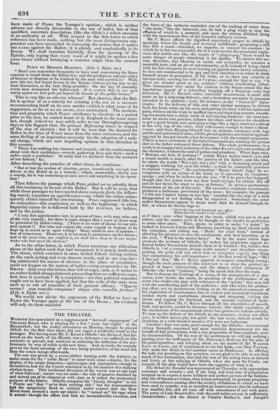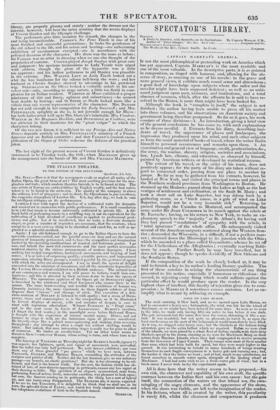THE THEATRE.
WEBSTER has speculated on a supplemental " farewell engagement" of CHARLES KEAN, who is playing for a few " more last nights" at the Haymarket; but the scanty attendance on Monday, though he played Othello for the first time there, did not augur a profitable result to the manager. Not having seen Mr. C. KEAN'S Othello—his Richard, that fol- lowed on the heels of his Hamlet, was a sickener—we suffered an idle curiosity to prevail, and resolved on enduring the infliction of his per- formance by way of relish to the new three. And, in truth, the tragedy proved the more amusing of the two, being productive of far more fun than the comic doings afterwards. The cue was given by a scene-shifter turning aside the Adriatic, to make room for the " noble Moor" to enter with arms a-kimbo, for the display of his ample draperies,—picturesque and appropriate enough in themselves, had not the wearer reminded us by his manner of a stalking clothes-horse. This incidental diversion of the waves was an apt type of what followed: nature was set aside—the tide of passion dammed up and turned out of its channel at will—just as it suited the momentary purpose of the histrio. Othello compares his " bloody thoughts " to the Pontie sea" that " ne'er feels retiring ebb ;" but his representative had the sanguinary flood so entirely under control that the New River-head seemed a more apt simile : he " turned on" his rage when it suited—though the effort cost him no inconsiderable exertion, and the force of the outburst reminded one of the rushing of water from " the main inike the turncock, too, he had a plug ready to stop the effusion of wrath in a moment, and anon the stream dribbled along with the monotonous flow of the kennel's ordinary current. Mr. C. KEAN affects the dignified superiority proper to Othello by speaking below his breath and seeming indifferent ; presenting a still face like a mask—intended, we suppose, to conceal his emotion : in which he is but too successful, for if it were not for the occasional explo- sions that startle one like the report of " ginger-pop," there would be some danger of people mistaking it for apathy. To correct this no- tion, therefore, and likewise to excite our sympathy, he assumes a mournful tone, and an air of sad solemnity, as it instead of being elated with his fair conquest, he were bearing up against sonic heavy calamity : he does not condescend to be gay and look cheerful even when he finds himself secure in possession of his bride, or to show any surprise at unexpectedly meeting his wife at Cyprus—enough for him to say, " it gives me wonder great as my content," without manifesting either. This larmoyante tone made the address to the Senate sound like the lugubrious appeal of a schoolboy begging off a flogging—only less animated. Mr. C. KEAN's voice, naturally monotonous, is made still more so by a sing-song delivery, and a tremulous utterance in passages intended to be pathetic ; such, for instance, as the " Farewell" Apos- trophe. In the delivery of this, and other similar passages, he throws back his head, turns up his eyes, and patting his brow with his tightened palm, whines out his woes in muffled tones and drawling accents, wreath- ing his mouth into a sickly smile of self-pitying fondness : the next mo- ment he starts into position, inflates his chest, and heaves his shoulders to get a good breath, and, springing at Iago like a tiger, roars out a threat at the very top of his voice, with vehemence enough to burst a blood vessel ; and then, flinging himself into an attitude, continues with legs astride and outstretched arms, till the pit and galleries are tired of applaud- ing, and he has got breath, when he resumes with his wonted composure. This is a mere caricature of his &titer's mannerisms, wanting the genius that in the father redeemed those defects. The whole performance, in a word, is an exaggerated imitation of the elder KEAN'S style and reading of the character, without the soul of pathos and grandeur. When Iago says, " Beware, my lord, of jealousy !' young KEAN makes round eyes and a round mouth to match, after the pattern of his father ; and like him, he utters the words " Not a jot, not a jot," with a humming sound mid a snigger, winking his eyes the while,—a trick he constantly practises to express " emotion :" the exclamation " Blood ! blood ! Iago,' he ac- companies with an action of the hand, as if squeezing an imaginary sponge ; and when he bellows out the vow, " If I do prove her haggard, though that her jesses were my dear heart-strings, I'd whistle her off and let her down the wind to prey at fortune," he gives a pantomimic illustration of the art of falconry. His excessive emphasis occasionally produces a ludicrous perversion of the sense for example, the passage " I felt not Cassio's kisses on her lips," sounded like time rage of a man disappointed at not finding what he expected. Sometimes the actor makes SHAKSPERE appear to mean more than he himself thought he did ; us where he directs Iago to " Go to the bay and disembark may uffers: Bring thou the neuter to the citadel:" as if there were other luggage at the creek, which was not to be got ashore, and the master were to be brought to the citadel in preference to some other place. Then, again, in order to make " a point," he rushed in between Cassio and Montano, knocking up their swords with his yataghan, and culling out, " Hold ! for your lives," instead of allowing his presence to awe the combatants, and first inquiring, as in the text, " What is the matter here?" So in the scene where Iago awakens the jealousy of Othello, lie makes his suspicions appear in- flamed before SHAKSPERE intends them to be kindled ; for, besides that Othello is "of a constant, loving, noble nature," and therefore unsus- pecting, his pride will not allow him to recognize eagerly any thing that compromises his self-importance : at the first word of lap, " Ha! I like' not that," Mr. C. KEAN appears to suspect something wrong; though the main purpose of this interview is to show the gradual ap- proach of Iago's insinuations, and the almost wilful obtuseness of Othello—the word "jealousy" being the spark that fires the train. But to discuss the bearings of a scene, or the metaphysics of a clia- meter, were beside the mark, in speaking of the performance of an actor who studies the play with reference to the " points " that may tell with the unreflecting part of the audience ; and who relies for produc- ing effect, not on spontaneous feeling, or on the unstudied comment of his expression of countenance, but on violent and unnatural transitions, sudden starts and contortions, shouting and stamping, heating the breast and tapping the forehead, and the manual exercise of melo- drama. To follow Mr. C. KEAN through all his absurdities of speech, look, and gesture, would be tiresome indeed ; this slight exposition of the mechanism of his mountebank tricks has grown too tedious already. To sum up the defects of his Othello in one sentence—it does not affect you ; it neither moves pity nor grief: the last scene, indeed, would be shocking, as a cold-blooded murder, if it were not ludicrous. COOPER'S Iago was quite good enough for the Othello : conventional villany formally expressed and most carefully demonstrated for the benefit of dull perceptions, with a due proportion of false emphasis, were its characteristics. Of the rest of the performers we will say nothing ; passing over the buffoonery of Mr. BR1NDAL'S ROderigO for the sake of his good intention ; and keeping silent on the merits of Mr. WALTER LACY as Cassio, out of compliment to his fair bride, crst Miss T AYLOR, who made her &hitt in her married name as Desdemona. In offering the lady our greeting on this occasion, we are glad to he able to say thus much of her personation, that had the rest of the acting been as natural and lively as her rallying of Othello when she sues for Cassio, our account of the play would have been the opposite of what it is. The School for Scandal was represented on Thursday with appropriate costumes and scenery ; and if the long and loud note of preparation tempted us to expect a more brilliant and perfect picture of the fashion- able life of SHERIDAN'S time, than is here presented, its general propriety and eraisemblance, coming after the medley of fashions to which we have been used in comedy, was so manifest an improvement that its influence was sensibly felt, and all went off with smoothness if not with spirit. The party at Lady Sneerwell's, with the card-tables set out, is sufficiently characteristic ; and the dinner at Charles Surface's, and Joseph's
library, are properly gloomy and stately : neither the dresses nor the interior, however, will bear the strict scrutiny that the scenic displays of Covent Garden and the Olympic challenge.
The performers give little occasion for remark, the changes in the cast being inconsiderable. FARREN'S Sir Peter Teazle is one of his most finished and successful personations: he looks the gentleman of the 01(1 school to the life, and his action and bearing—one unbecoming exhibition of uxoriousness excepted—are in accordance with the polished decorum of the character. His dress was the same as before ; for FARREN was an artist in dressing when no one else thought of the proprieties of costume. COOPER played Joseph Surface with great care and judgment : his specious insinuations to Lady Teazle were urged with address, though the gloss of the hypocrite was a little too apparent ; and his hollow politeness to old Stanley was plausible In the extreme. Mrs. WALTER LACY as Lady Teazle looked not a -whit the less handsome for the odious bell-hoop she wore ; and her husband as Charles Surface showed to advantage in his powdered wig. STniclL.tND as Sir Oliver looked a veritable nabob in his cut- velvet suit—only, according to stage nature, a little too florid in com- plexion for an Indian resident. WEasma as Moses exhibited a proper admixture of dirt and finery, ugliness and subserviency—he seemed bent double by bowing : and 0. Smrrii as Snake looked more like a villain than any recent representative of the character. Mrs. DANSON has not acid enough in her composition for lady &teemed ; and Mrs. FITZWILLIAM, sprightly as she is, is not juvenile enough for Maria : but both ladies acted well up to Mrs. GLOVER'S inimitable Mrs. candour. WRENCH as Sir Benjamin Backbite, and licensroxi.: as Crabtree, were too plebeian in their insolence for the "great vulgar" to which the characters belong. Of the two new farces, it is sufficient to say Fweiyu Airs and Native Graves depends entirely on Mrs. FITMILLIAM'S mimicry of a French danseuse and an Italian cantatrice ; and that FARREN'S comical exem- plification of the Organ qf Order redeems the dulness of the practical jokes.



























 Previous page
Previous page